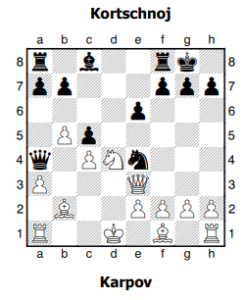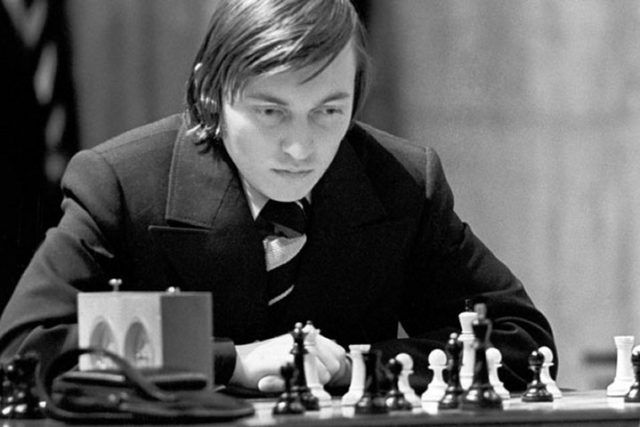In the series Champion Born On This Date, I wish to present Anatoly Karpov- the champion who can be considered to be the most original player of all times.
Anatoly Karpov- One of the Most Feared Opponents
Anatoly Evgenevich Karpov never followed the known paths of Chess strategy. He never worked hard and was criticised of ‘having no clue of what Chess is’. Yet he was the most feared opponent for almost two decades because not many could guess his very next move.
Karpov was born on 23rd May, 1951 at Zlatoust, Russia. He showed exceptional talent in defeating well-known Chess players very early in life and improved much faster than other players of his age. In fact, as a boy, he was better than his friends in all intellectual activities and even card games.
In 1969, Karpov won the World Junior Chess Crown, thereby becoming a real force to reckon with. The Western Chess world started taking about him a bit seriously but still, he was never considered to be a genius.
When Karpov won the World Championship Throne in 1975 due to ‘forfeit’ by Bobby Fischer, the Western media looked down upon Karpov as if it was his fault.
Despite of all these, Anatoly Karpov reigned supreme for a full decade before losing the World Championship Match to the ‘Child of Change’, Garry Kasparov.
Anatoly Karpov- Unique and Unparalleled
Probably Anatoly Karpov is the strongest endgame player of all times, with a deep sense of endgame planning and strategy, combined with engine-like accuracy. His ability to improve his position without letting the opponent having a slightest clue of it was always a masterstroke. With this, he easily won ‘drawn’ endgames.
Karpov is probably the only Chess player who remained the World Championship Challenger for almost a decade after losing the World Chess Crown. In fact, Kasparov and his team took several years to find the right way of fighting Karpov, which involved a multi-fold complex strategy.
Anatoly Karpov’s contribution to closed Ruy Lopez (Spanish) opening and the Boleslavsky Pawn structure in Sicilian defense is unparalleled. One of his moves in the Spanish opening, against Grandmaster Unzicker, is still known as the ‘Move of the (20th) Century’.
Anatoly Karpov’s Cabinet
Karpov is an avid philatelist and reader. He is known to have large collection of Chess stamps and Chess books. His private library consists of 9,000 books.
Here is the list of Awards won by Karpov in his long outstanding career-
- Order of the Red Banner of Labour in 1978
- Medal “For outstanding contribution to the (Stamp) Collector business in Russia”
- Honorary member of the Soviet Philately Society (1979)
- Diploma of the State Duma of the Russian Federation No. 1
- Order of Lenin in 1981
- Order of Holy Prince Daniel of Moscow, 2nd Class in 1996
- Order of St. Sergius of Radonezh, 2nd class in 2001
- Order of Merit for the Fatherland, 3rd Class in 2001 for outstanding contribution to the implementation of charitable programmes, strengthening of peace and friendship among people
- Order of Merit, 2nd class (Ukraine) in 2006 for his contribution to the victims of the Chernobyl disaster
- Order of Friendship in 2011 for his great contribution towards productive social activities
- Medal of Tsiolkovsky Cosmonautics Federation of Russia
- Medal For Strengthening the Penal System
- 1st and 2nd class Breastplate of the 1st degree of the Interior Ministry International Association of Chess Press
- 9 times voted the best chess player of the year and awarded the Chess Oscar
- Order of Saint Nestor the Chronicler, 1st class
- Asteroid 90414 Karpov is named after him
- Karpov International Chess Tournament, an annual round robin tournament is held in his honour in Poikovsky, Khanty-Mansi Autonomous Okrug, Russia since 2000
- Order for Outstanding Achievements in Sport from Republic of Cuba
Learn from the Champion
Today we will see a comparatively unknown game of Karpov, played several years past his peak against none other than his arch-rival in the 1970s, Viktor Kortschnoi, who was 77 then. Though not at their peak, the players showed the same fearlessness and originality as they had shown in 1970s.
Anatoly Karpov (2655) – Viktor Lvovich Kortschnoj (2598) [E32]
4th Odessa Pivdenny Bank, 31.05.2008
1.d4 Nf6 2.c4 e6 3.Nc3 Bb4 4.Qc2 d6 5.a3 Bxc3+ 6.Qxc3 c5 7.Nf3 0–0 8.dxc5! dxc5 9.b4!
With the last two moves, White has started an attack against Black’s dark squares, typical of Karpov’s positional style.
9…Nc6 10.Bb2 Qb6?
Kortschnoi, just like in his youth, started the firework at an early stage but the combination turns out to be a faulty one.
10…Re8 was called for, though it might have resulted in a slow but certain death.
11.b5 Nd4!?
After the quiet retreat 11…Ne7 White dominated the board with 12.a4
12.Nxd4 Ne4!
 The point. Black wants to exploit White’s weakness at d2 and f2 with a Queen check along the ‘a5–e1’ diagonal.
The point. Black wants to exploit White’s weakness at d2 and f2 with a Queen check along the ‘a5–e1’ diagonal.
13.Qe3!
Forced.Not 13.Qd3? Qa5+ 14.Bc3 Qxc3+ when Black is slightly better. Or if 13.Qc2 then 13…Qa5+ forcing 14.Bc3 anyway.
13…Qa5+ 14.Kd1 Qa4+
[14…cxd4 15.Qxe4]
15.Qb3!?
15.Kc1?! is risky on account of 15…Qxc4+ 16.Kb1 f5.
15.Nb3 immediately was more accurate but it doesn’t matter as Black is compelled to repeat the moves anyway, allowing this possibility to White two moves later.
15…Qa5!
15…Qxb3+ offers no relief. For example, 16.Nxb3 Nxf2+ 17.Ke1 Nxh1 18.g4! f5 19.Bg2 fxg4 20.Bxh1 and Black can resign.
16.Qe3 Qa4+
 17.Nb3!! Nxf2+
17.Nb3!! Nxf2+
17…Qxc4 can be met with the same reply 18.Ke1! Rd8 19.f3! winning easily.
18.Ke1! Nxh1 19.Qc3!
The point!
Black is unable to defend against dual threat of 20.Qxg7 checkmate & 20.Nxc5 winning the trapped Black Queen. Black resigned.1–0




